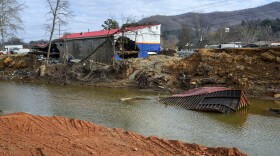The National Centers for Environmental Information, located in Asheville, is working to restore its services after suffering damage from Helene. While existing physical and digital records are safe, the research institute has not ingested any new data since Sept. 26.
That's because servers at NCEI require a robust cooling system, which relies on municipal water from the city of Asheville. Officials say full restoration of the water system is still weeks away.
"We will have some data loss," said NCEI Director Deke Arndt. "We are in the process of... establishing alternatives to the cooling systems that were in place."
Partner organizations are being asked to store their own data locally until servers are back online.
"We have been working nonstop with our partners... to have them help us," said Arndt. "We are fairly confident that for the most critical weather and climate records, we will have captured all of those."
Communications specialist Jake Fortune estimated NCEI ingests nearly 270 terabytes of data a month. The entire archive is more than 65 pedabytes in size.
"We archive everything from the surface of the sun to the bottom of the ocean," said Fortune.
NCEI is considered the world's leading authority on environmental data. The agency, which operates under NOAA, relocated to Asheville from New Orleans in the 1950s. At the time, Asheville was chosen because of its closer proximity to Washington D.C., and because it was thought to be a historically safe climate area.
Fortune and Arndt said this is the longest outage NCEI has experienced. When servers are back online, it will likely take weeks to catch up on the backlog of data.
Arndt said the type of data NCEI collects is even more critical, as western NC looks at recovery after Helene.
"We know that these kinds of situations are going on around the country… and that there's some connection to a changing climate," said Arndt. "We have tens of thousands of data sets… (but) the most important assets are the people with hearts and hands that help the world make sense of this information."








